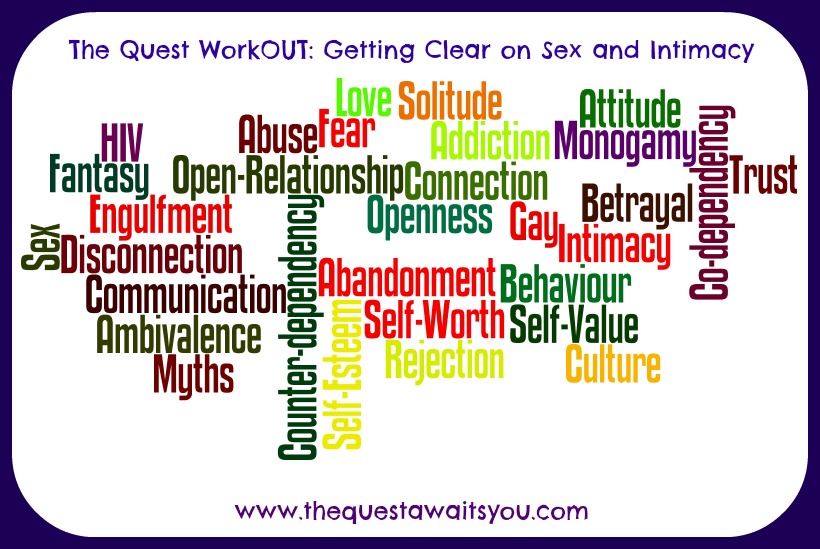Ade: In our upcoming one-day workshop on April 13th we will be exploring Sex and Intimacy. Do you feel that many gay men are able to distinguish between the two? We often see Sex portrayed in many of the gay magazines, and very little said about Intimacy, Connection, Openness and Engagement. I think many of us know the language of Sex and only few know the language of Intimacy. When I look back to when I came out in my late 20s, my approach based on what I saw was – sex first, intimacy second.
Darren: Yes and often we think the act of sex is intimacy when in fact it can be totally lacking in intimacy. So how would you describe the ‘language of intimacy’?
Ade: I would say the language of intimacy is the same as the language of Vulnerability. I recently heard Brene Brown say vulnerability has three components – Risk, Emotional Exposure and Uncertainty. When I look at my own journey with intimacy, it’s when I allow myself to be open to those three components, that I find myself in a space of connection and authenticity with the person that I am with. You?
Darren: The language of Intimacy, for me, is about being seen. When I allow all of me to be seen by a person without masks, act or fluff. It’s when I drop trying to be something and just start being. Like, being how I am when I am alone with myself, but ‘witnessed’ in this state by others. When I allow this to happen then the 3 components that Brene talks about are present. There is the thought that I am ‘not enough’ by just being me and so to allow the ‘just me’ to be seen leaves a space of uncertainty…will the other person/ people think I’m ok? It’s about valuing our pure self and not hiding it.
Ade: Indeed, by allowing myself to be vulnerable, I show myself to the other without my masks. There are still moments when my old scars and wounds tell me that ‘vulnerability’ is weakness and then I try to compensate in some shape or form and in those moments, I notice that the intimacy connection is broken. I guess for many gay men we’ve learnt to be self-sufficient, which in a way is saying ‘no’ to vulnerability and as such many of us struggle with the language of intimacy. Many of us however know the language of ‘sex’ very well. That is what we often see around us, those are the tales that have been passed on down from the previous generations – media, family, culture, society. I just came across this quote, which is an extract from a 1967 US documentary called ‘The Homosexuals – “The average homosexual, if there be such, is promiscuous. He is not interested or capable of a lasting relationship like that of a heterosexual marriage. His sex life, his love life, consists of a series of one–chance encounters at the clubs and bars he inhabits. And even on the streets of the city — the pick-up, the one night stand, these are characteristics of the homosexual relationship” Sadly, this is a stereotype that many still carry – some consciously, some unconsciously.
Darren: Wow that is strong! I think that the idea of sexual identity was unheard of in those days and that being gay was seen purely as a sex orientation. Everything points towards the sex rather than the person. In a way it dehumanizes gay people and says that we are a sex act. That thinking is still very much alive for both gay and straight people. Parents think that they cannot talk to their young (5/6/7 year old) gay children about their identity because they think it is about sex and should wait until they are teenagers or sexually active. Some gay people also think that their being gay is just about sex and that ‘what goes on behind my closed doors is just my business’. This emphasis on sex denies the idea that we are gay people that we have a distinct identity
Ade: So true. I was with some gay men recently when two of the guys mentioned that they were currently celibate. There were a couple of guys in the group who did not feel that a gay person could be celibate, and the question of ‘so are you still gay’ was asked – as if, it was simply the act of sex that defined these guys as gay. I now come across many guys who do want to speak the language of intimacy, but they often meet guys who want to speak the language of sex; guys who want physical/sexual intimacy and not emotional intimacy. I guess it’s all about speaking both languages – taking off the masks. And to do that I guess we return to our regular theme of ‘healing old wounds and acknowledging old scars’, for if we don’t heal our wounds or pay attention to our scars, then perhaps we will keep returning to old habits and behaviours. I guess the way men are perceived in our culture also plays a part in all this. For many men do not do emotional intimacy, but are well versed in sexual or physical ‘intimacy’.
Darren: It’s interesting that many of the guys on our workshops allow themselves to be more intimate than they ever have been or even are with their friends and partners. We create the conditions for intimacy to be present – and this is within a group. It turns on its head the often prevailing idea that intimacy is only for couples and only during the sex act. At The Quest workshops we experience intimacy, with groups and no sex involved – that’s quite revolutionary! And it is such a beautiful experience and the guys are really moved and fulfilled when it happens. Sadly it can almost seem like a mirage, as we then have to return to a world where this level of connectedness is limited. I suppose in some ways, events like football matches and church services can act as a kind of group intimacy exercise!
Ade: Yes, a space is created where the guys take off their masks and in doing so; they face their old wounds and scars and a different way of being. I guess for many its then about how to clearly and authentically express their needs when they step out of that environment – so if someone wants to have sex, and knows deep down that this is what he wants fine. But if someone wants connection and emotional intimacy, and someone thinks I will automatically get that by having sex, then that person needs to pause a second and explore what’s going on. There is something about getting clear in identifying and authentically expressing our needs when it comes to relating with others – intimate partners and friends.
Darren: Yes and we are frightened of expressing those needs because we often judge being needy as wrong. For many people saying ‘I need to be held’ is a lot more scary than saying ‘ I want a fuck’, as sex is seen as an acceptable, even valued need, whereas intimacy is seen as weak and wrong.
Ade: The list is indeed long and include – ‘I am not good enough’, ‘I am not worthy’ and ‘I am a mistake’. And this is where the language of vulnerability comes in – for in taking that risk to drop the mask and be emotionally open, face our fears and embrace uncertainly, we step into a space of intimacy. Therefore in order to express our authentic needs we need to take a risk and know that the other person might not necessarily respond in the way that we hoped and that’s okay. We also need to be aware of where we might be sabotaging our longing and desires for intimacy. I know for me, sometimes I don’t take that risk because I think I am going to be hurt or seen as not enough, and then I kick myself later for not being good enough. Gosh! This authentic expression stuff does require constant practice!
Darren: Yes we kill something before (we imagine) it kills us. I remember falling in love and being vulnerable and then when the relationship ended I think I shut part of myself down. It was as if I blamed the intimacy and love for the end of the relationship whereas that had nothing to do with why it ended. I unconsciously blamed my openness for the hurt I felt when it ended. I blamed the wrong thing and then punished ‘intimacy’ by saying I wouldn’t make that mistake again- ludicrous really. Rather than experience joy we would rather kill it off because we cannot bear the idea of it not lasting forever. So now I distinguish Joy from Pain and that makes it easier to allow myself to experience joy.
Ade: I like that, for intimacy does release ‘joy’. For me intimacy feels like this open door and I have no idea what is beyond the door, but in order to go through I must drop everything I am carrying and simply trust. So, very often I whisper to myself ‘everything is going to be okay’ before I go through that door. Saying ‘I love you’ is one of such doors for me. It’s not something that I had said to me growing up, or heard in my early relationships with boyfriends and friends; I often therefore felt a sense of vulnerability before saying it. For saying it meant taking off my mask and saying ‘here I am in my bareness’. Sometimes, in saying it I find myself thinking the other can see my vulnerability. And then it passes and I do not die and the world does not end. It is an ongoing journey. So, final thoughts?
Darren: Yes, I would encourage anyone reading this confab to join in the conversation by either commenting below or by attending our workshop on April 13th – it’s open to all Gay men and we will be exploring these themes more in a very interactive way. By the end of that workshop there will be a lot more clarity around sex and intimacy, which will allow us to move forward confidently.
Ade: I’m looking forward to continuing the conversation online and in and our session next month!
Join us on Twitter or Facebook to continue the discussion.






2 thoughts on “Getting Clear on Sex & Intimacy”
would there be another workshop on the same topic in the near future?
AS it so happens, this weekend is also the fundraising weekend for me!
I am gutted of the time/day clash.. Typical.
Hello Steve
Not in the near future – as we have the themes for this year all picked – but hopefully sometime next year, as we have had similar enquiries from others….
Hope to see you at one of our other events.
Warmly, Ade